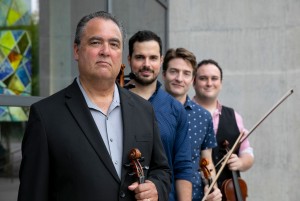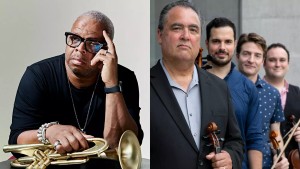ISLAND PRAYERS

We are the first human beings in history to have so much of man’s culture and previous experience available for our study, and being free enough of the weight of traditional cultures to seek out a larger identity; the first members of a civilized society since the Neolithic to wish to look clearly into the eyes of the wild and see our self-hood, our family, there.
—Gary Snyder “Four Changes” Turtle Island, 1975
Thirty-eight years ago, four American string players formed a quartet with the express purpose of melding the wide range of music performed in North America, both past and present. To honor the significant lineage of these musical traditions and the profound relationship between them, the quartet borrowed an “old/new name for the continent, based on many creation myths of the people who have been here for millennia.” “Turtle Island” is the origin story shared by many First Nation people of the Eastern Woodlands, where it is said that the entire continent of North America was built from soil placed on the back of a great Turtle. This myth has inspired a unifying bond between many tribes.
Since its inception, the Turtle Island Quartet has undergone many transformations. Just in the last year, they have begun transitioning from an ensemble that features a hybrid of arranged standards and new repertoire, such as the group’s recent Bird’s Eye View, to an original music ensemble. To commemorate their new identity, the quartet, resident composer and violinist David Balakrishnan with violinist Gabriel Terracciano, violist Benjamin von Gutzeit and cellist Naseem Alatrash, has taken on an ambitious, multi-composer commission. Island Prayers will celebrate the range of influences within the rich cultural spectrum of the continent “Turtle Island.” The group has identified four (4) venerable and accomplished composers with varying life experiences and musical foundations:
1. Six-time GRAMMY®-award winner and double Oscar® Nominee Terence Blanchard is a genre-defining voice with a gargantuan range of work. Unlike any artist before him, Blanchard has graced the very top of every list with fans and critics alike– film scores with Spike Lee, Regina King, George Lucas and Kasi Lemmons; having his operas featured at the Metropolitan Opera, Washington National, Chicago Lyric and Opera Theater of Saint Louis and his jazz projects with legends like Herbie Hancock, Art Blakey and Wayne Shorter– there is no parallel to Terence Oliver Blanchard.
2. MacArthur Genius Fellow, Singer and Banjo player Rhiannon Giddens draws her influence from her education and virtuosity in western classical music and from studying foundational traditions such as the Griot of Mali to inform her raw execution of bluegrass and other American roots music from Tidewater and Appalachia. Giddens is the current artistic director of the Silk Road Ensemble and her her first opera, Omar, won the 2023 Pulitzer Prize.
3. New Music USA Composer-in-Residence and Joyce Award Winner Jerod Impichchaachaaha’ Tate is no stranger to composing for major ensembles— Impichchaachaaha has written for San Francisco Symphony and Chorus, ETHEL, National Symphony and Dallas Symphony, just to name a few. Impichchaachaaha is also a citizen of the Chickasaw Nation; their stomp dances implore the shaking of turtle shells among many traditions involving the turtle & Turtle Island.
4. GRAMMY®-award winning Turtle Island Quartet founder, composer in residence and violinist David Balakrishnan has been preparing for this project his entire life. Beginning in his early career when he formed this world-famous quartet to now, Balakrishnan’s eclectic compositions and arrangements have defined an entire genre of chamber music.
Terence Blanchard: A Tale Of God’s Will
A Requiem For Katrina

In the wake of Hurricane Katrina in 2005, New Orleans native son Terence Blanchard created an impassioned, Grammy Award-winning work: A Tale of God’s Will: A Requiem for Katrina. This updated work is an evening-length, emotional tour-de-force of anger, rage, compassion, melancholy, and beauty.
20 years later, Blanchard is touring this work to commemorate all the events surrounding Katrina and how the great crescent city overcame this adversity. For this updated version of the song cycle, Blanchard has added new arrangements with his band the E-collective, along with the double Grammy Award-winning Turtle Island Quartet, to create a tapestry that captures the destruction of the hurricane and redemption of the great city of New Orleans following the disaster.
“After being paired back for Turtle Island Quartet, Blanchard’s writing hits more starkly.” -The New York Times